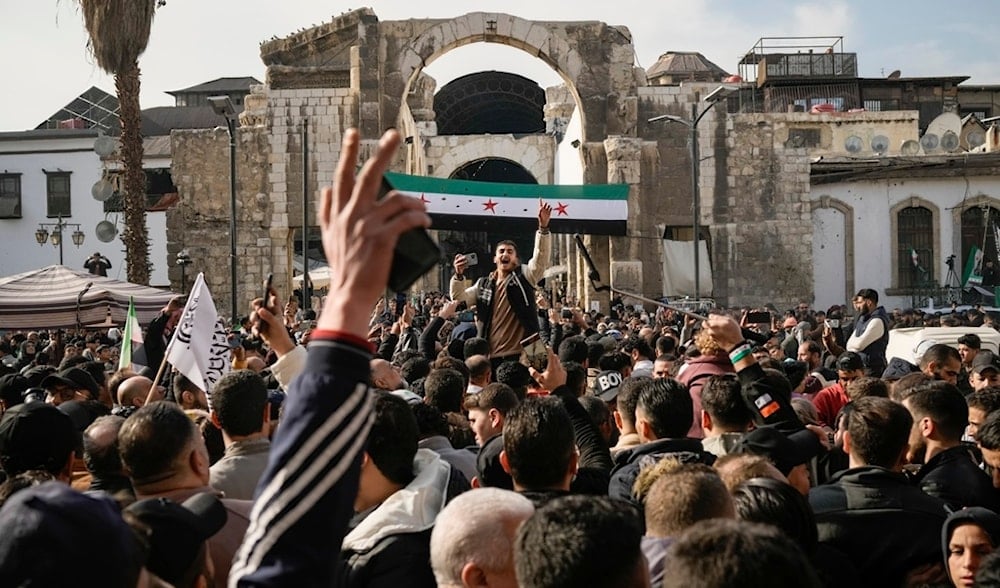West testing Syria's new government ahead of sanctions decision: WSJ
The US and Europe have been reportedly watching Syria's new government as it takes charge of the country, comparing its previous conduct to its current promises, before making major decisions.
-

A man shouts as others celebrate the fall of Bashar al-Assad's government after Friday prayers at the Umayyad Mosque in Damascus, Syria, on Friday, December 20, 2024. (AP)
The United States and Europe face a dilemma in Syria: Either cooperate with the current authority of designated terrorists long wanted by the West, or risk losing influence in the country and region to other governments willing to engage with it.
According to the Wall Street Journal, diplomats from Washington and European capitals visited Damascus this week to assess whether they can trust the emerging transitional government led by Hayat Tahrir al-Sham (HTS).
This situation mirrors past dilemmas, such as the Taliban's rise to power in Afghanistan and the challenges posed by governments with unclear human rights commitments. HTS, initially formed as an al-Qaeda subsidiary, is led by Ahmad al-Sharaa, who spent five years in a US prison camp in Iraq. He has since claimed to renounce extremism and vowed to respect Syria's ethnic and religious diversity.
Before the West decides to lift sanctions off Syria, it stated clear directives that would guarantee the protection of minorities and women, and the complete destruction of alleged chemical weapons developed during the Assad tenure. The current government must also vow to counter terrorist groups such as ISIS and return the millions of Syrian refugees scattered around the world back home.
But most importantly, the West, according to WSJ, does not want Syria to fall into the hands of Iran or Russia. "Western states are quickly coming to the conclusion that they have to engage with HTS despite its terrorist listing," Julien Barnes-Dacey, director of the Middle East and North Africa program at the European Council on Foreign Relations, said.
What the West expects
Barbara Leaf, the State Department's top Middle East official, and Roger Carstens, the special presidential envoy for hostage affairs, met with Ahmad al-Sharaa in Damascus on Friday, marking the first visit by US diplomats to the Syrian capital since Assad’s regime collapsed on December 8.
Leaf announced that Sharaa had committed to preventing terrorist groups from threatening Syria, the US, or its regional partners, leading the US to remove the $10 million bounty it had placed on him years ago.
The US currently has about 2,000 troops in Syria, primarily focused on countering ISIS and other extremist groups. Leaf also emphasized the importance of broad consultations in forming a new government that includes women and represents Syria's diverse ethnic and religious groups. She described her conversation with al-Sharaa as "productive" and "detailed," noting that while he appeared pragmatic, the US would judge his actions rather than just his words.
European diplomats who also met with the new Syrian authority noted "clear efforts to push Iranian influence out of the country," but stressed that despite focusing on building Syria with the help of the returning diaspora, the new government is likely to make mistakes due to their inexperience in governing.
Meanwhile, British officials believe that the former rebels are seeking reform and do not intend to establish a tyrannical regime, according to a UK diplomat who met with the group. However, there are concerns about whether HTS will follow through on its promises.
The biggest issue remains whether the West should lift its sanctions, imposed since the start of the conflict in Syria, as well as its terrorist designation of the current authority, or not, amid al-Sharaa's repeated requests.
However, the Western nations remain wary and are monitoring the situation to see whether the current government fulfills its promises or maintains its old ways.
Read more: US scraps $10mln on Sharaa's head amid promises to protect US assets

 4 Min Read
4 Min Read








